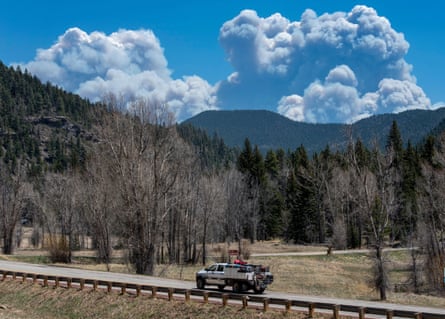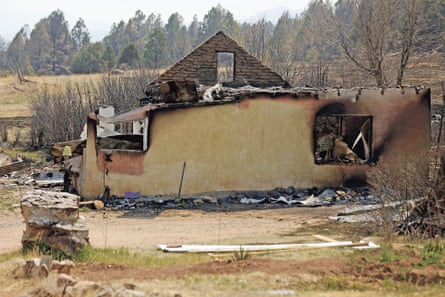A raging New Mexico wildfire was headed toward a ski resort and the 1,000-year-old community of Taos as howling winds continue to push the erratic flames forward.
Officials on Wednesday issued warnings for more people to prepare to evacuate as the fast-moving fire picked up momentum. As people fled, flames raced through parched forests and firefighters tried to protect homes from a blaze that has burned a 45-mile-long path up the Sangre de Cristo mountains in just over a month.
Families in Taos Canyon and the Angel Fire ski resort crammed belongings into cars and trailers after they were told to be ready to go.
“There is a possibility with the models that we’re running, that those areas are going to see fire,” Todd Abel, a battalion chief with the National Wildfire Coordinating Group, told a briefing.
Meanwhile in southern California, a wildfire that erupted Wednesday afternoon raced through coastal bluffs of multimillion-dollar mansions, burning at least 20 homes, fire officials said. The flames were fanned by gusty ocean winds but they were dying down Wednesday night. No injuries were reported.
The fire, which occurred in Laguna Niguel, was relatively small at about 200 acres (81 hectares) but the wind drove embers into palm trees as well as dense, dry brush on slopes and steep canyons that hadn’t burned for decades, said Brian Fennessy, chief of the Orange county fire authority.
Fennessy said climate change has made even small fires, that once would have been easily contained, extreme threats to life and property throughout the west.
In New Mexico, the governor said on Tuesday the risk of more destruction is high and that the long-term costs of recovering from the huge blaze, currently the largest burning in the country, will soar.
Two more days of strong winds and dangerously bone-dry conditions are in the forecast before some relief is expected on Friday.
Crews were most concerned on Tuesday night about risk of the huge fire east of Santa Fe spread farther north toward rural towns and mountain resort communities closer to Taos – about 20 miles (32km) from its current northern edge.

The main highway north from Holman to Taos was closed and additional communities were placed on alert for potential evacuations.
“It is very active. This is a big push, a lot of energy right now,” fire spokesperson Todd Abel warned on Tuesday night.
Governor Michelle Lujan Grisham said during a briefing earlier on Tuesday that she had not received any reports in recent days of widespread damage to homes amid the latest round of fierce winds that fanned the blaze and created challenges for firefighting crews.
Crews have been trying to direct flames around houses in numerous small villages on the northern and southern ends of the fire – bulldozing firebreaks, putting up sprinklers, clearing trees and raking pine needles. A force of nearly 1,800 firefighters and support personnel are assigned to the blaze, including specially trained teams.
The cost of fighting the blaze and another smaller fire burning near Los Alamos National Laboratory has topped $65m.
The cost is expected to grow with wind predicted through Wednesday, and Lujan Grisham said the cost to reconstruct houses, prevent post-fire flooding and restore the forest charred by the larger fire after it is out will probably reach billions of dollars.
“When you think about rebuilding communities, it is not an overnight process,” Lujan Grisham said. “So we should be thinking in terms of significant resources and those resources in my view should largely be borne by the federal government given the situation.”
The wildfire has burned about 300 structures, including houses, since it started last month. Some areas remain under evacuation orders, but authorities on Monday started letting some residents on the fire’s eastern flank return home.
A federal disaster already has been declared due to the blaze, which is partly the result of a preventive fire set in early April that escaped containment. The flames merged with a separate fire a couple of weeks later, and as of Wednesday the jagged perimeter stretched more than 370 sq miles (236,939 acres).
Structure protection was focused on Tuesday night around Mora and Holman, where Highway 518 north to Taos was closed. Authorities stressed there was no immediate threat to communities around Taos but new alerts about possible evacuations stretched as far north as the Angel Fire ski resort east of Taos.
“Coming up toward Taos, Black Lake, Angel Fire, there is the possibility with the models we are running that those areas are going to see fire,” Abel, an operations chief on the fire in the Santa Fe national forest, said at a briefing on Tuesday evening.

The governor said she would challenge anyone who didn’t believe the federal government should accept significant liability. “It’s negligent to consider a prescribed burn in the windy season in a state that is under an extreme drought warning,” she said.
Members of New Mexico’s congressional delegation and others have called for an investigation. While forest officials have yet to release planning documents related to the prescribed fire, they have said forecasted weather conditions were within parameters for the project.
Meanwhile, the smaller blaze burning in the Jemez Mountains prompted officials at Los Alamos National Laboratory, where nuclear research is conducted, and the nearby town of Los Alamos to prepare for evacuations as a precaution.
Nearly 900 people were fighting that fire, with its price tag nearing $16m on Tuesday. Towering columns of smoke from both fires could be seen from miles away as the winds picked up on Tuesday afternoon.
Wind and low humidity levels continue to be big wildfire threats around the west as the National Weather Service issued red flag warnings for extreme fire danger in much of New Mexico and parts of Nevada, Arizona, Colorado and Texas.
Forecasters said New Mexico is outpacing most other recent years for the number of red flag days in April and so far this month. Crews also were battling smaller fires elsewhere in New Mexico and Arizona.
